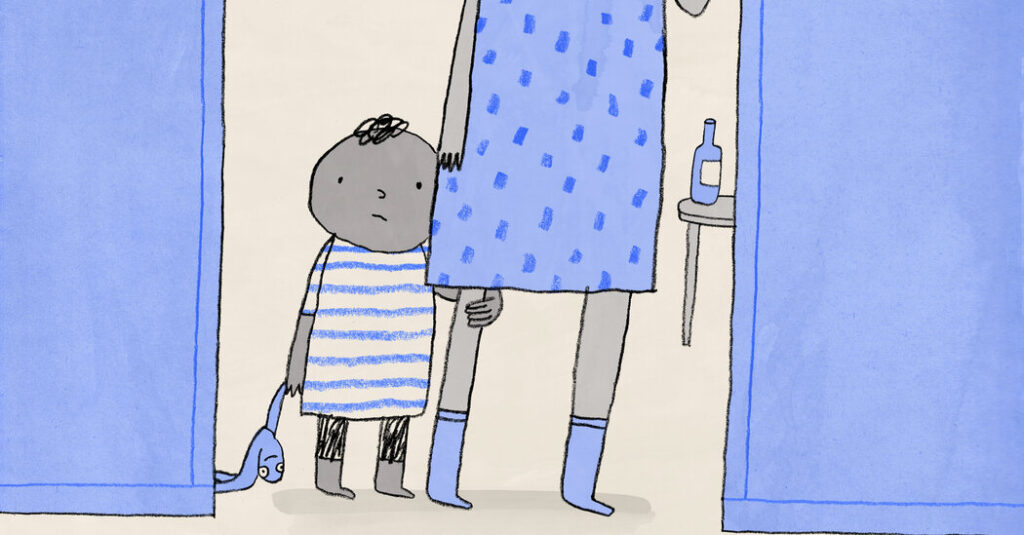I don’t remember the court date. I don’t remember the notices in the mail, the missed phone calls, the messages from lawyers or much about the week before. What I do remember is the sheriff standing in the doorway and my sweet son watching from the bottom step of the staircase behind me.
The real wound isn’t what happened that day. It’s everything I cannot remember.
Who forgets the day they lost custody of their child? What kind of mother forgets that? A drunk one.
My son was 6 when I missed the hearing that, in my absence, ended with custody being awarded to his father. That morning, I hadn’t even known I was supposed to be in court. I was too far gone in the drinking by then — in denial, in crisis, in deep — to register the significance of what I had missed.
We were at our home in Kamloops, British Columbia, when the sheriff arrived — me, hungover and foggy; my son, still in pajamas at 2 p.m., watching a movie. The man stood in the doorway holding official documents that confirmed what I hadn’t yet understood: I had already lost him.
I didn’t argue. What was there to say?
The sheriff handed me the order. I was no longer legally allowed to keep my son. And just like that, he was leaving. I knew I couldn’t stop it. I didn’t try. I stood frozen, too late, too ashamed, too undone, while my son looked back at me — confused, scared, silent.
He didn’t know what was happening, but he knew something had broken. And I was the one who had let it break.
The custody ruling deemed me unfit. But that look on my son’s face — it showed something far worse — the moment a child begins to understand that his mother isn’t protecting him. Not from the system. Not from herself. That is the moment I wish I could forget but never will.
I didn’t fight for him then. I couldn’t. I wasn’t even standing on solid ground. But I would later. For years.
Alcoholism had lived in the background of both sides of my family, but I’d always thought I was insulated. I was college-educated, competent, ambitious. I was the snack parent at soccer games. I made homemade muffins. I read “Franklin the Turtle” books at bedtime.
I didn’t know I had this slippery, unmerciful disorder living inside me, and that the emotional turmoil of my marriage’s demise would release it.
At first, it was a glass of wine at bedtime. Then two. Three. Then bottle after bottle. Soon frequent blackouts, waking up not knowing how badly I had failed the day before.
By the time my son was 9, I was sober, barely. I had a few months of recovery behind me and a flicker of hope in front. I was living in a rented basement suite, broke and trying to claw my way through a legal process I didn’t fully understand.
We had supervised visits every other weekend in neutral living rooms with worn-out furniture, at parks with forlorn green spaces that seemed to mimic the vast divide he and I shared and at playgrounds too cheerful for what we were carrying. He would walk in like a stranger, polite, guarded, scanning for clues about who I had become. He didn’t remember the mother who baked muffins or read “Franklin the Turtle.” He remembered the chaos, the missed dinners, the mornings I wasn’t quite there.
Later, when we no longer needed a supervisor present, something I once claimed as a legal victory, the visits still felt stiff, fragile. Our first hour was always cautious, the second more relaxed. But by hour three or four, his anxiety would return, an unease about letting his guard down too much. We couldn’t laugh too hard or get too close. We spent so much time trying to remember who we were to each other that we barely got to simply exist together.
By then I was fully sober but trying too hard. I smiled too big. Overexplained. Looked at him like I was begging him to see how much I loved him. But love that comes with an apology in every glance is a heavy thing to hand a child.
The real unraveling came quietly, in slow motion.
He grew more distant. His smile faded quickly. Every affectionate moment seemed to cost him something when we parted. And eventually, the cost got too high.
He stopped answering my calls. Stopped smiling. Stopped looking back. And I couldn’t steer him away from his own self-protective impulses.
I had placed all my hope in the courts. Like so many parents, I believed that if I told the truth and followed the rules, the system would help make it right.
But family court isn’t built for repair. It names winners and losers. And when one parent wins, the child always loses something.
I thought the fight was how I proved I loved him. But fighting didn’t bring him back. It only pushed him further away.
And then, one day when he was 12, he said it: “I don’t love you. I never want to see you again.”
Not hate. Not anger. Just the flat finality of a heart too tired to keep trying.
That’s when I stopped fighting.
I didn’t give up. I shifted.
I stopped thinking love was something I had to prove with court documents and supervised visits and legal bills. I stopped chasing every possible way to make him see I had changed. I started focusing on actually changing.
I stayed sober.
I stayed steady.
I stayed available.
I learned not to fill the silence with explanations or apologies. I stopped trying to fix things and started showing up in quiet, invisible ways. And over time, the texture of our contact began to shift.
We still had the occasional visit, the birthday phone call, the expected check-ins that had always felt slightly choreographed. But now, something else started to surface. Subtly. Slowly.
After graduating from high school, he ventured out into the world for the first time, and maybe that allowed him to change how he saw me, and to realize he had carried a longing. A quiet ache that had never gone away.
And somehow, he began to recognize the thing I had been offering in that crucial shift: my undemanding presence. My gentle persistence. My willingness to wait, without pushing.
Then one day, he called. Not for a holiday or obligation. He called just to talk.
Then he called again, to tell me something small about his day. Something no one had asked him to share. But he offered it freely.
And I knew, in that moment, I had become someone he could trust again.
Not because I had fought harder. But because I had stopped fighting.
By then, both our lives had changed. I was remarried. I had two younger children, his half-siblings, who had known his name since they were old enough to speak, had asked about him often and saw him maybe once a year as they all grew up, apart. When they would ask about him, I would answer gently, without an agenda.
And when he did come back, it wasn’t to reclaim something lost or to pretend nothing had broken. He didn’t return to a house or a schedule or a version of me preserved in memory. He returned to the mother I had become, one who had carried the truth of our story and did not try to rewrite it. He came back not to begin again but to begin anew — as two people shaped by distance, grief and love that had endured underneath it all. We didn’t start over. We started forward, with what was left and what we were willing to build.
That was four years ago.
Love, especially maternal love, is rarely found in court documents or weekend visitation schedules. It’s found in the quiet choice to stay steady, to heal without needing to be seen, to love without demanding love in return.
The legal system can draw boundaries, but it cannot rebuild trust. It cannot parent. It cannot undo estrangement. It cannot hold a child’s heartbreak the way a mother must eventually learn to — patiently, silently, over time.
That work is ours.
And what I learned is this: You don’t win a child back by proving you’re right. You earn your way back by becoming someone safe and steady who they might want to return to when the noise finally quiets.
He didn’t come back because I won. He came back because I made room, and kept it warm, until he was ready.
Kate Gilgan is a writer in Glenavon, Saskatchewan.
Modern Love can be reached at [email protected].
To find previous Modern Love essays, Tiny Love Stories and podcast episodes, visit our archive.
Want more Modern Love? Watch the TV series, sign up for the newsletter and listen to the podcast on iTunes or Spotify. We also have two books, “Modern Love: True Stories of Love, Loss, and Redemption” and “Tiny Love Stories: True Tales of Love in 100 Words or Less.”
The post I Was Deemed Unfit to Be a Mother appeared first on New York Times.




